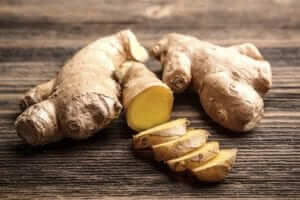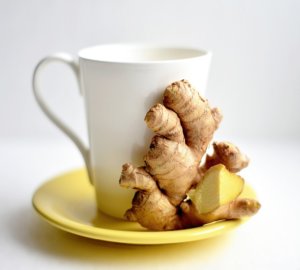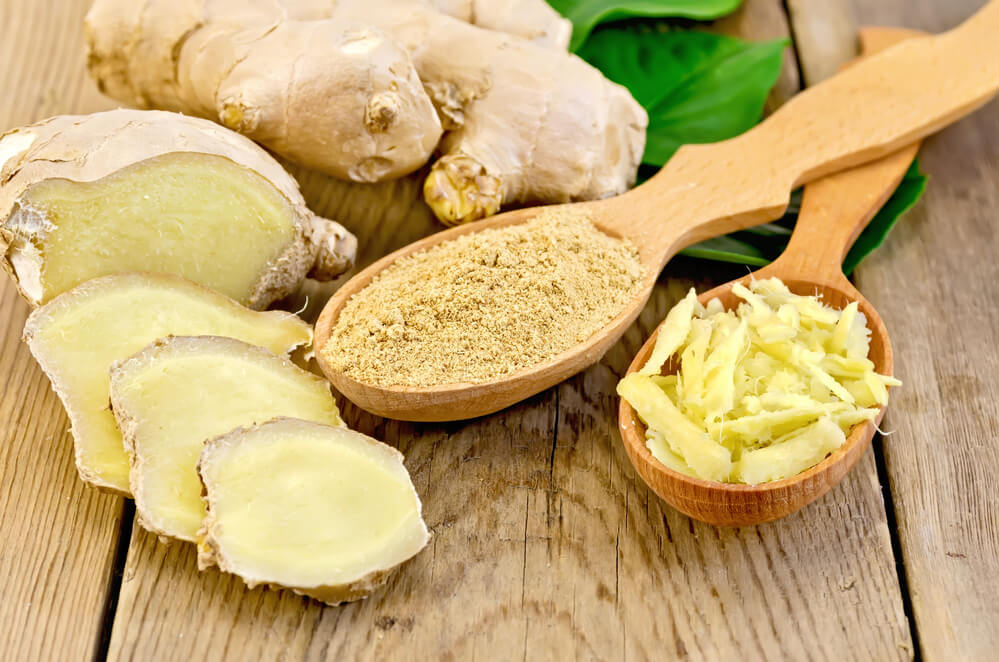Ginger is a powerful spice to have on hand in your cupboard. It has been used since ancient times for food and health and is a cousin to one of the most well-known superfoods— turmeric.
A potent digestive tonic, ginger is full of plant compounds that can calm inflammation, support brain function, and potentially fight cancer. It’s an extremely versatile spice and can be added to your diet as a powder, fresh root, tea, juice, or extract.
Here’s more about this outstanding plant and the top ginger root benefits for health.
The Background on Ginger Root
Ginger (Zingiber officinale) comes from a flowering plant native to tropical and subtropical regions of Southeast Asia. It’s related not only to turmeric, but also to other edibles like cardamom and galangal, which all belong to the same plant family.
The knobby roots of the plant (technically known as rhizomes) are the part that is harvested and sold as ginger. They have a fairly good shelf life and can be shipped and sold fresh all around the world or dried and ground into a powder.
If you’ve ever tried even a little bit of ginger root, you know it packs in some serious heat. This spiciness, along with the zesty flavor of ginger, features in many dishes and desserts: curry, kimchi, soups, gingerbread, ginger ale, and more.
Like many other spices, ginger was once highly sought after and expensive, making it available only to the elite. In fact, a pound of ginger was once equivalent in value to the cost of an entire sheep!
Of course, the importance of ginger went far beyond its use as a culinary spice. It was utilized in several traditional medicinal systems— including Chinese, Indian, and Iranian medicine— and particularly regarded for its warming and digestive-boosting properties.
Not surprisingly, modern studies are now confirming many of the traditional benefits of ginger as well as discovering new potential.
Top Ginger Root Benefits for Health
Contains Gingerol & Other Bioactive Compounds

Ginger is packed full of active compounds, the most abundant of which is gingerol.
Gingerol is concentrated in the natural essential oils found in ginger root and is responsible for giving the spice much of its heat and flavor. It acts as a powerful antioxidant and is thought to be responsible for many of ginger’s health-boosting properties.
Along with gingerol, ginger root contains smaller amounts of phenolic compounds like quercetin, zingerone, and gingerenone-A as well as terpenes like zingiberene.
All of these compounds contribute even more to the antioxidant capacity of ginger and help to protect your body from oxidative stress when consumed. As you may know, oxidative stress is a big contributor to many age-related diseases, so reducing it is critical if you want to age well.
Overall, ginger is one of the top antioxidant spices you can consume and has even been shown to help protect glutathione, a highly important antioxidant produced by your body.
Has Anti-Inflammatory & Antimicrobial Properties
Like many other antioxidant-rich spices, ginger root has massive benefits for your health by combating inflammation.
Inflammation is not always bad, but when it becomes chronic, it can do some serious damage to your body. This type of inflammation is closely connected to oxidative stress, and both are believed to fuel numerous chronic diseases.
Antioxidants, of course, are key to fighting oxidative stress and chronic inflammation— and ginger is packed full of them.
Several studies have confirmed the anti-inflammatory nature of ginger, even finding that it can reduce the amount of certain circulating inflammatory mediators. Specific compounds in ginger root may also inhibit the synthesis of other inflammatory markers.
Along with this inflammation-fighting power, ginger has shown powerful effects against multiple pathogens.
It has specifically shown effectiveness against oral bacteria linked to periodontitis and gingivitis, the respiratory syncytial virus (RSV), and various strains of fungi— including some that are resistant to antifungal drugs!
Outstanding for Digestion

It’s fair to say that ginger is one of the top herbs/spices for supporting healthy digestion.
One of its most well-researched benefits is an ability to fight several types of nausea. Studies have shown that the root is most effective for pregnancy-related nausea (i.e., morning sickness) but can also relieve chemotherapy-related nausea and post-surgery nausea.
You might also want to consider reaching for ginger when indigestion hits.
A traditional folk remedy for gas and a sluggish digestion, research has now found that ginger can specifically help indigestion by speeding up stomach emptying. This in turn may help with post-meal symptoms like feeling overly full, abdominal pain, and bloating.
Interestingly, the best way to use ginger in this situation is to take/eat it before a meal (30-60 minutes is best). In one study, this approach sped up stomach emptying by almost twice as much versus a placebo.
Helps Ease Certain Types of Pain
Another “ancient” ginger root benefit for health is pain relief. Given the antioxidant and anti-inflammatory properties of ginger, this really comes as no surprise and now has confirmation from modern research.
Several studies have focused specifically on ginger and osteoarthritis because the root appears to be particularly effective for this health problem. Overall, ginger supplementation was seen to significantly reduce pain as well as disability associated with osteoarthritis.
Another approach found that using ginger topically in combination with cinnamon, mastic, and sesame oil was also highly effective at reducing pain and stiffness associated with osteoarthritis. In fact, this herbal “ointment” had comparable effects to a conventional salicylate ointment.
Ginger has also been studied for its ability to ease menstrual pain and cramping.
Astonishingly, at least one study has shown that ginger powder taken in capsules can be just as effective as drugs like mefenamic acid and ibuprofen at relieving menstrual pain!
Other research indicates that ginger can be effective against exercise-induced muscle pain, too. Most likely, it can help with even more pain-related issues that haven’t specifically been studied yet.
Supports a Healthy Heart

There are many factors that contribute to a healthy or not-so-healthy heart, but cholesterol and blood pressure are two of the biggest for many people.
Research has shown that ginger can have a significant positive impact on both of these factors when consumed regularly.
For example, one study found that 3 g of ginger taken daily was able to reduce total cholesterol, LDL (bad) cholesterol, and triglyceride levels. There was also an increase in HDL (good) cholesterol levels.
As far as blood pressure is concerned, ginger has shown an ability to reduce both systolic and diastolic blood pressure, possibly by acting as a natural calcium blocker and ACE inhibitor. Daily consumption of ginger is also associated with an overall lower risk of developing hypertension.
Perhaps even more impressively, one small study found that ginger was able to lower two more major risk factors of heart disease known as the ApoB/ApoA-I ratio and malondialdehyde (MDA).
Larger clinical trials are still needed to confirm these results, but ginger is certainly making a case for itself as a top heart-booster.
May Lower Blood Sugar Levels
One of the more recently discovered ginger root benefits for health is an ability to lower blood sugar. Studies are still limited in this area, but the ones that have been conducted so far have had outstanding results.
As a prime example, one small study involving participants with type 2 diabetes found that 2 g of ginger powder a day reduced fasting blood sugar by about 12%. The ginger supplementation also improved hemoglobin A1c (HbA1c) quite dramatically, reducing it by about 10% over a 12-week period.
This suggest that ginger may have a direct impact on blood sugar and potentially help with blood sugar regulation long-term.
Other studies have shown that taking ginger root may benefit insulin sensitivity as well, which is another important factor involved in diabetes and other metabolic diseases.
Hopefully, more research will be undertaken on this specific aspect of ginger to determine just how effective it can be for blood sugar improvements.
Contains Cancer-Fighting Compounds

Like so many other herbs and spices, ginger is full of compounds with cancer-fighting potential. Of particular note is the spicy compound highlighted at the beginning of this article: gingerol.
In a form known as 6-gingerol, this powerful component of ginger has documented effects against various cancer cell types. It has also been highlighted as having antiproliferative, antitumor, and anti-inflammatory activity.
Overall, there is some evidence that ginger extract may be specifically active against colon cancer, pancreatic cancer, liver cancer, breast cancer, and ovarian cancer. It has also shown promise for combating prostate cancer, even blocking cancer cell and tumor growth according to some research.
Keep in mind that in spite of these hopeful results, research has mostly been limited to test-tube and animal studies along with a few small human trials.
More studies are needed to determine just how much of a cancer fighter ginger can be, but its top-notch antioxidant content will still help protect your health as a whole in the meantime.
May Boost & Protect Brain Function
Declining cognitive function has become a hallmark of getting older but it’s not inevitable. There are some key ways you can start protecting your brain power right now, including by consuming antioxidant-rich foods.
Essentially, because both oxidative stress and chronic inflammation are thought to be connected to age-related cognitive decline, filling up on antioxidant-rich foods— like ginger— helps reduce these two stressors, keeping your mind sharper as you age.
Several animal studies have already confirmed that ginger extract does have the potential to help protect against age-related cognitive decline. It has even demonstrated anti-Alzheimer’s properties, although it remains to be seen whether these will translate to the human brain.
Promisingly, one study that involved middle-aged women found that ginger extract did improve overall cognitive function, particularly reaction time and working memory.
The bottom line is that while more research is still needed, ginger root is already a great “brain booster” to keep in your cupboard.
Ways to Consume Ginger Root

Not only are there numerous ginger root benefits for health (as you’ve just seen), this is also one easy spice to add to your diet because of its versatility.
For many people, the easiest way to consume ginger is as a powder.
If you like the flavor, you can sprinkle the powder liberally on both sweet and savory dishes or add to your favorite smoothie. Or if you prefer, ginger powder can be taken in capsules for a more concentrated “dose”. (There’s no single recommended amount of ginger to start with. Most studies range from 1-3 grams per day.)
Another option is to buy whole ginger root and consume it raw.
You can grate the root into soups, stir fries, smoothies, oatmeal, and much more— the options are nearly endless. Or to kickstart your digestion before a meal, try a little freshly grated ginger root with a splash of lime juice and a sprinkle of salt.
By simmering slices of fresh ginger in water, you can make a spicy tea that is soothing for an upset stomach. With a bit of lemon juice and some raw honey, ginger tea also makes an excellent natural cold and flu remedy.
Finally, if you really want to take it up a notch, try out this simple lemon-ginger-garlic “shot” to benefit from a trio of superfoods.
Are There Precautions with Ginger?
Unless you are sensitive to spicy foods, ginger is generally well-tolerated. However, for some, ginger can cause heartburn and indigestion, especially if consumed in large amounts.
Some research suggests that high doses of ginger may increase bleeding risk. The results are not conclusive, but it’s still best to be cautious taking large amounts of ginger if you are taking blood thinners or have a surgery approaching.



Really interesting and potentially useful information, thanks
Thanks, Brian,
A very informative article.I also understand that ginger has a synergistic relationship with turmeric, boosting the benefits of each when taken together.
Sincerely,
Gary
Yes, Gary, the synergy exists.
There’s an ancient Ayurvedic formula that combines curcuma (or turmeric), ginger and, most important as a sort of catalyst, black pepper.
I make my own mixture. Although there may somewhere be a well-refined ratio, I do it by rule-of-thumb. For example, 7 parts of curcuma, 2½ parts of ginger, ½ part of black pepper.
One way to use this is to mix a teaspoonful in warm water and drink it before meals. It depends on wghat your goal is.
Yes, Gary, the synergy exists.
There’s an ancient Ayurvedic formula that combines curcuma (or turmeric), ginger and, most important as a sort of catalyst, black pepper.
I make my own mixture. Although there may somewhere be a well-refined ratio, I do it by rule-of-thumb. For example, 7 parts of curcuma, 2½ parts of ginger, ½ part of black pepper.
One way to use this is to mix a teaspoonful in warm water and drink it before meals. It depends on what your goal is.
thanks for the information. It will help if it turns out I might have cancer.
Great article. I’m a ginger fan. Have taken raw ginger when on a boat to counter act seasickness. Sprinkle ground on my oats in the morning. Will try grating some root. Take Youth tablet daily.
7True…. Ginger is a cure for colds.
I’ve ordered and tried Youth Fountain… I love the smell of the vitamin and it’s easy to swallow.
I don’t like the taste of ginger so this makes it so easy to get the benefits of this spice.
I will order it again.
I love ginger root. I slice it and put a little lemon juice add hot water. Makes a great “tea”
Thank you! Interesting and Informative article! love ginger!
Grew up with this recipe. I tbsp fresh grated ginger, organic brown sugar to taste or raw honey, 2 tbsp organic butter, 2 cup or so of carrots sliced like coins( I use frozen sometimes). If raw carrots cook till almost done in a bit of water. For frozen till same stage. Then add rest of ingredients and simmer till carrots are soft and any remaining water is gone. This forms a sauce. Pot lucks and family never leave any leftovers!
oooh, yummy! I am going to try your recipe. Does it have a name?
Thanks for this useful information.
Thank you for these very useful information on how to help prevent some diseases and improvements of the overall Health by consuming ginger roots in our diets in our daily life, as I’m originally from Asia Pacific Island country and ginger is our number one spice plant that has been ued in generations and Iam happy that now Western countries are now starting to learn and use the gingerroots now.. Thank you. 🙂
Thank you for the very informative and useful article about ginger!
Loved this info on ginger! Was very informative.
Wow! great information. I add grated ginger to my morning smoothies but I can see now a lot more uses..
Yvonne
Thank you for the comprehensive round-up of information on the benefits of ginger. I enjoy drinking hot water grated ginger, turmeric and lemon juice, with a grind of black pepper. a great combination of healing herbs and spices.
Thank you for sharing and learning about ginger health benefits from today ginger is welcome in home.
I grate root ginger fresh every morning to have with granola as my breakfast. I haven’t been ill/even slightly unwell all this winter.
can’t speak highly enough of root ginger
Thanks for more great info and to all the comments.I have been using raw ginger as part of my 4 spice ( turmeric, garlic and onion ) of course I also use black pepper. I have found a lot less aches and pains in my body since I started regular use .
Thank you Brian for all you do. I love ginger and use it if I have indigestion, but I will try the recipe for pre-meal ginger that you suggest, before eating a restaurant meal.
Patricia
Thank you for the info. We enjoy ginger tea every night after dinner. Maybe we should have it before dinner, according to the info?
Interesting article. I love the taste of ginger. I grow ginger in my home garden. /
great article Brian
I have fresh ginger in my green tea every day and I am very grateful for its benefits
I truly believe it helps keep my chrons dis-ease at bay I have been in remission for over two years now and I don’t get the upset tummy or the aches and pains like I used too
ginger is definitely a secret weapon to healing
Thank you for confirming what I already know to be true.
Great article. My favorite way to use ginger: fine chop gingerroot and add 2% non iodized salt by weight and ferment on counter until salty taste is gone. Keep refrigerated and use along with lemon in 2ndary ferment to flavor homemade kombucha.
Interesting and informative article. Thank you for publishing it. I love ginger and eat it everyday. I used to eat only fresh ginger root, but now I use a pure powder from a well-sourced company.
I love love love ginger. Make ginger tea with lemon honey 4 ltr at a time and drink it through out the day in my drink bottle. I also add turmeric and drink a glass every day, I recommend ginger regularly.
very informative. thank you
I use ginger, turmeric, cumin mix as a sprinkle when roasting veggies. Guess I should add pepper for an added boost. Also going to try your “shot”
I am going to start a daily regimen of consuming ginger, cinnamon m beets to help combat my high blood pressure, maybe even tumeric